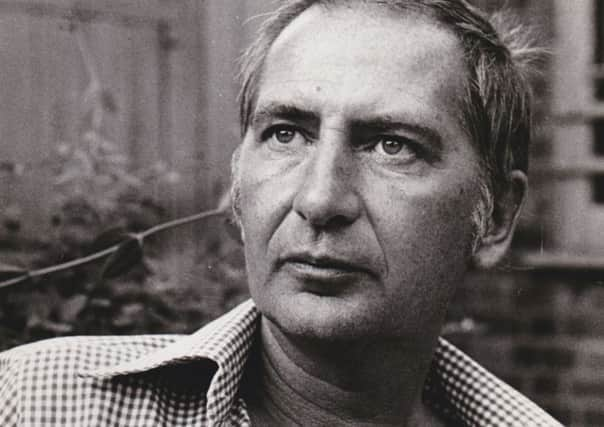Obituary: Paul McDowell, actor, musician, painter, teacher and writer


Seldom in life do we get a chance to experience and thrive/succeed in an assortment of careers but Paul McDowell did just that. Known as “Whispering” Paul McDowell, he was the lead singer and co-founder of the Temperance Seven, which earned a No1 spot in the 1960s/1961; he wrote comedy sketches for shows, including The Two Ronnies, The Frost Report and for Sheila Hancock while later appearing on TV, notably in Porridge, and gained small film credits in the 1978 remake of The Thirty Nine Steps and National Lampoon’s European Vacation (1985) with Chevy Chase; aged 70, he began teaching Tai Chi at a Greek holiday resort and in the UK.
Looking back on his life McDowell reflected on “the many different people I had been in my lifetime and how they were all strangers to me now. And I probably wouldn’t like any of them.”
Advertisement
Hide AdAdvertisement
Hide AdPaul McDowell was born in 1930s Fulham, south-west London and was the only son of William, a former shipyard worker turned museum security guard, and Frances, a cleaner and landlady. Early childhood memories were of moving flats around the area and his mother chasing rats from under his cot; he attended a number of primary schools in and out of London during the Blitz, being evacuated to Guildford, Rochdale and Torbay.
He left Bolt Court Technical School aged 15 and worked as a road sweeper and messenger for a Polish shipping company. During this period he received informal education from an art student lodger, who introduced him to the Russian writer and philosopher Dostoevsky and French films.
After two years National Service in the RAF, where he became involved in the amateur dramatics society and “cultivated a posh voice,” which helped on occasion to get him off “a variety of charges,” he was admitted to Chelsea Art School in 1954. Despite winning first prize for his year, he surprisingly failed his final exams, which was later discovered to be due to undiagnosed dyslexia; he subsequently continued producing portraits and exhibiting his wares on park railings around Hyde Park where he made a few sales.
While at college McDowell also became interested in jazz taking-up the trombone and formed a band with fellow students as an “Art School Dadaist lark”; it had a number of incarnations, including Paul McDowell and his Gentlemen Ravers.
Over a number of years, the group morphed into the Temperance Seven, which had nine members, and specialised in a novel mixture of Goonish antics and deadpan renditions of British 1920s and 30s-style trad jazz; kitted out in Victorian or Edwardian clothes, they began to attract a cult following. Although sacked as their trombonist, McDowell was quickly invited back as their vocalist, delivering his semi-spoken vocals through a megaphone in the clipped accent of 1920s received pronunciation.
Following some early recordings which were made for the small Argo label, George Martin of EMI’s Parlophone label, and the Goons’ manager, was persuaded to take them into Abbey Road studios. In 1961, ‘You’re Driving Me Crazy,’ featuring McDowell’s sophisticated vocals was released and two months later topped the charts; another three hit singles were released with Pasadena reaching No.4 and being their biggest seller. They were in demand and performed a Royal Command Performance at the London Palladium with Shirley Bassey and toured extensively, while McDowell “put in some serious work on destroying my marriage, committing a series of infidelities with women far less beautiful than my wife”.
During breaks from the band, he found work as a performer in revue at the Edinburgh festival and on the BBC Home Service’s Monday Night at Home programme. He soon tired and left the band, replaced by Allan “Moody” Mitchell.
McDowell returned to acting and writing sketches for the TV satire shows That Was the Week That Was and The Frost Report, and appearing at Peter Cook’s Establishment club. In 1964, he toured North America as the Establishment with Robin Grove-White and successfully performed in satirical shows at Chicago’s The Second City theatre company. Upon returning home, he wrote sketches for David Frost, The Two Ronnies and Marty Feldman while also appearing in television and films.
Advertisement
Hide AdAdvertisement
Hide AdDuring the 70s, McDowell played the ill-tempered prison officer Mr Collinson in the series Porridge and Colin Phillips in the 1980s romantic comedy, The Two of Us; further parts followed in Dave Allen at Large, EastEnders, Only Fools and Horses, The Good Life and Tales of the Unexpected. He even played Churchill’s butler in ITV’s Winston Churchill: The Wilderness Years (1981)
Film credits included the laird in The Thirty Nine Steps, starring Robert Powell, and appearing in Chemical Wedding (2008), directed by Julian Doyle, the Monty Python editor, a budget British supernatural horror/sci-fi movie, with Simon Callow, a mild-mannered Cambridge don who becomes possessed by the spirit of the infamous occultist Aleister Crowley.
In 1987, McDowell wrote Dope Opera, a madcap detective story and later penned an entertaining memoir, All Those Lives (2014).
McDowell married three times. He is survived by his third wife, Trisha, and their children Sidonie and Milo and two daughters from his earlier marriages, Helena and Lola.